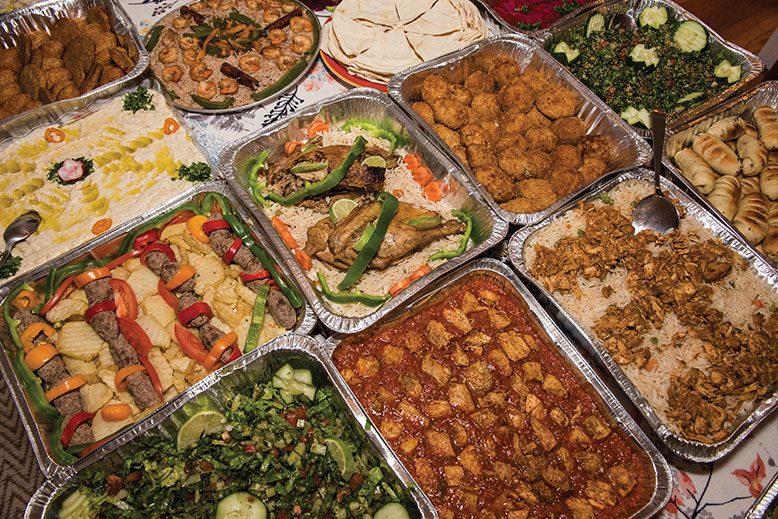
All Bob Zarady knew was that he and his wife were going to eat Syrian food in someone’s house in Millburn. Their old friends, Tammy and Vinnie Grillo, had invited them. “Any opportunity to be with the Grillos and eat is a good time,” says Zarady.
To explain things, Tammy sent him a link to something called Syria Supper Club. “I was really excited to learn what this was all about,” Zarady says. “To try to help world peace.”
World peace is a big agenda for a dinner party. But Syria Supper Club—a local venture that brings Syrian refugees into private homes to cook Syrian meals for up to 20 guests, each paying $50—does help move the needle. Moreover, 85 to 90 percent of the money goes to the cooks. The rest covers administrative expenses.
The idea was hatched in December 2015, when Kate McCaffrey, a professor of anthropology at Montclair State, and Melina Macall, who teaches food justice at William Paterson, each happened to call the rabbi of their Montclair synagogue, B’nai Keshet, concerned about the Syrian refugee crisis. The rabbi wisely teamed them up.
McCaffrey, who’d been getting to know the refugee community, was thinking that the Jewish community should make a statement in support of refugees. “I’m an anthropologist; I’m not a social worker,” she says. But Macall went immediately to the idea of a meal. “Pretty much everything I touch turns into something about food,” she says.
Ten days after that phone call, B’nai Keshet held a dinner for local Syrian refugees, organized by McCaffrey and Macall. At the dinner, Macall recounts, a refugee named Mohammed Zakkour stood up and said, “‘We’re all children of Abraham.’ There was not a dry eye in the house.”
In September 2016, the women launched the project in its present, in-home form. So far, Syria Supper Club has racked up more than 200 suppers with 2,500 attendees and an informal rotation of 40 cooks.
The gathering Varady attended on a Saturday in November was held in the home of Susan Norkin and Brian Simon, who have hosted about eight such dinners. The stars of the evening, as usual, were the cooks. They happened to be none other than Zakkour and his wife, Samar. Having spent the previous two days cooking, they arrived with a staggering array of aluminum trays filled with food. They also brought two of their four children: Zain, a spunky 8-year-old with a firm command of English, and Maria, 18 months old and the family’s first American citizen.
The Zakkours fled Syria in 2011 after hostilities reached their neighborhood in Homs. They languished in a Jordanian refugee camp for four years. Finally settling in Elizabeth in 2015, they were early members of a tight-knit Syrian refugee community there that has grown to just over 300. The Supper Club is a reliable source of income for the couple, supplementing Mohammed’s earnings as a part-time tailor. He made a good living sewing jeans in Syria before the war.
Susan Norkin welcomed the 13 guests, who had put on name tags; and Salma Nassan, the volunteer translator for the evening, opened lines of communication with the Zakkours, both of whom introduced themselves in English. “America very, very good,” Samar said. “I love America.”
“We’re really glad you’re here,” said Jen D’Agosta of South Orange. “This is a welcoming community—if you can look past all the craziness,” she added, referring to immigration politics.
Nassan, the translator, didn’t waste words describing the 30 different dishes. “This is cabbage. This is potato,” she said, pointing. “Pastry with cheese. Beet salad. Kibbeh. Rice with peas.” The feast also included classics like tabbouleh and fattoush, a salad topped with pieces of fried Syrian flatbread. When a guest asked if such a feast was typical for a family, Nassan laughed. Two or three dishes was more like it, she said.
The standout was a dish that guests referred to as “that red stuff” or “the one on the end,” for its position in the buffet. It had been made by Mohammed. Fiery red, with the consistency of hummus, the dish, harhora, is an exquisite marriage of savory and sweet. Just about everybody asked for the recipe, so Mohammed dictated it to Salma, who wrote it out in English. Harhora, it turns out, contains bulgur, raw onions, tomato paste, pepper paste, tahini, olive oil and one apparently magic ingredient: pomegranate molasses. The precious recipe circulated from guest to guest, with everybody taking pictures on their phones.
Zarady found the food rewarding the evening even more so. “Despite the bitterness infecting our political discourse now,” he said, “people from all over the world still want to come here because of our belief that anyone who comes here can live a quality and successful life.
“That is embodied in what I said to Mohammed’s son—that he has been given the same opportunities in education that I had at his age 50 years ago.”
